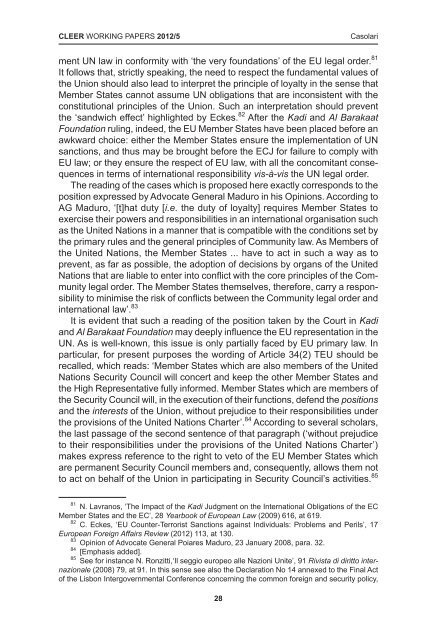Principles and practices of EU external representation - TMC Asser ...
Principles and practices of EU external representation - TMC Asser ...
Principles and practices of EU external representation - TMC Asser ...
You also want an ePaper? Increase the reach of your titles
YUMPU automatically turns print PDFs into web optimized ePapers that Google loves.
CLEER WORKING PAPERS 2012/5<br />
Casolari<br />
ment UN law in conformity with ‘the very foundations’ <strong>of</strong> the <strong>EU</strong> legal order. 81<br />
It follows that, strictly speaking, the need to respect the fundamental values <strong>of</strong><br />
the Union should also lead to interpret the principle <strong>of</strong> loyalty in the sense that<br />
Member States cannot assume UN obligations that are inconsistent with the<br />
constitutional principles <strong>of</strong> the Union. Such an interpretation should prevent<br />
the ‘s<strong>and</strong>wich effect’ highlighted by Eckes. 82 After the Kadi <strong>and</strong> Al Barakaat<br />
Foundation ruling, indeed, the <strong>EU</strong> Member States have been placed before an<br />
awkward choice: either the Member States ensure the implementation <strong>of</strong> UN<br />
sanctions, <strong>and</strong> thus may be brought before the ECJ for failure to comply with<br />
<strong>EU</strong> law; or they ensure the respect <strong>of</strong> <strong>EU</strong> law, with all the concomitant consequences<br />
in terms <strong>of</strong> international responsibility vis-à-vis the UN legal order.<br />
The reading <strong>of</strong> the cases which is proposed here exactly corresponds to the<br />
position expressed by Advocate General Maduro in his Opinions. According to<br />
AG Maduro, ‘[t]hat duty [i.e. the duty <strong>of</strong> loyalty] requires Member States to<br />
exercise their powers <strong>and</strong> responsibilities in an international organisation such<br />
as the United Nations in a manner that is compatible with the conditions set by<br />
the primary rules <strong>and</strong> the general principles <strong>of</strong> Community law. As Members <strong>of</strong><br />
the United Nations, the Member States ... have to act in such a way as to<br />
prevent, as far as possible, the adoption <strong>of</strong> decisions by organs <strong>of</strong> the United<br />
Nations that are liable to enter into conflict with the core principles <strong>of</strong> the Community<br />
legal order. The Member States themselves, therefore, carry a responsibility<br />
to minimise the risk <strong>of</strong> conflicts between the Community legal order <strong>and</strong><br />
international law’. 83<br />
It is evident that such a reading <strong>of</strong> the position taken by the Court in Kadi<br />
<strong>and</strong> Al Barakaat Foundation may deeply influence the <strong>EU</strong> <strong>representation</strong> in the<br />
UN. As is well-known, this issue is only partially faced by <strong>EU</strong> primary law. In<br />
particular, for present purposes the wording <strong>of</strong> Article 34(2) T<strong>EU</strong> should be<br />
recalled, which reads: ‘Member States which are also members <strong>of</strong> the United<br />
Nations Security Council will concert <strong>and</strong> keep the other Member States <strong>and</strong><br />
the High Representative fully informed. Member States which are members <strong>of</strong><br />
the Security Council will, in the execution <strong>of</strong> their functions, defend the positions<br />
<strong>and</strong> the interests <strong>of</strong> the Union, without prejudice to their responsibilities under<br />
the provisions <strong>of</strong> the United Nations Charter’. 84 According to several scholars,<br />
the last passage <strong>of</strong> the second sentence <strong>of</strong> that paragraph (‘without prejudice<br />
to their responsibilities under the provisions <strong>of</strong> the United Nations Charter’)<br />
makes express reference to the right to veto <strong>of</strong> the <strong>EU</strong> Member States which<br />
are permanent Security Council members <strong>and</strong>, consequently, allows them not<br />
to act on behalf <strong>of</strong> the Union in participating in Security Council’s activities. 85<br />
81 N. Lavranos, ‘The Impact <strong>of</strong> the Kadi Judgment on the International Obligations <strong>of</strong> the EC<br />
Member States <strong>and</strong> the EC’, 28 Yearbook <strong>of</strong> European Law (2009) 616, at 619.<br />
82 C. Eckes, ‘<strong>EU</strong> Counter-Terrorist Sanctions against Individuals: Problems <strong>and</strong> Perils’, 17<br />
European Foreign Affairs Review (2012) 113, at 130.<br />
83 Opinion <strong>of</strong> Advocate General Poiares Maduro, 23 January 2008, para. 32.<br />
84 [Emphasis added].<br />
85 See for instance N. Ronzitti,‘Il seggio europeo alle Nazioni Unite’, 91 Rivista di diritto internazionale<br />
(2008) 79, at 91. In this sense see also the Declaration No 14 annexed to the Final Act<br />
<strong>of</strong> the Lisbon Intergovernmental Conference concerning the common foreign <strong>and</strong> security policy,<br />
28

















